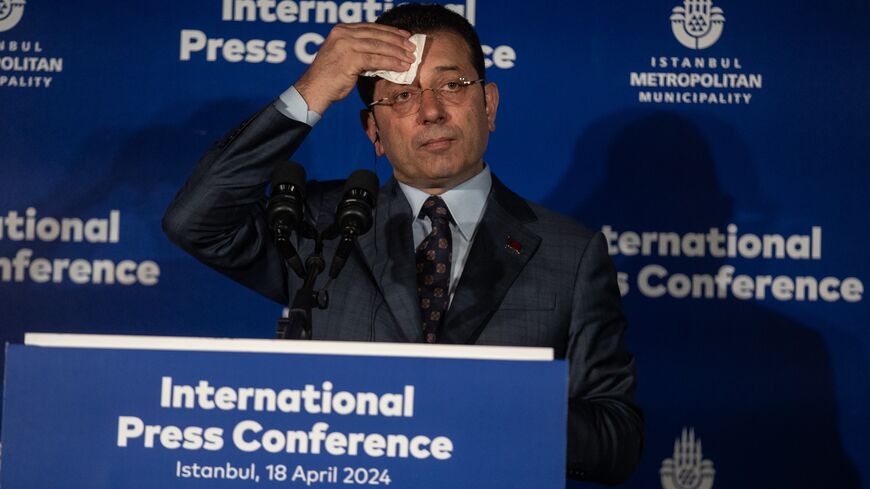ANKARA — Istanbul Mayor Ekrem Imamoglu's labeling of Hamas as a terrorist organization has sparked blowback from Turkey’s ruling party and its nationalist ally, but Turkish President Recep Tayyip Erdogan has yet to react to the remark.
Istanbul's popular mayor, affiliated with the main opposition Republican People’s Party (CHP), said last week that he considers Hamas to be a terrorist organization, marking an almost 180-degree departure from the Turkish government's position.
“Hamas of course carried out an attack in Israel that we are deeply saddened by,” Imamoglu told CNN International last week, according to a transcript released by the outlet. “And any organized structure that carries out terrorist acts and kills people [en masse] is considered a terrorist organization by us.”
Imamoglu also said that the “brutal oppression of Palestinians” should stop.
Omer Celik, spokesman for Turkey’s ruling Justice and Development Party (AKP), criticized the Istanbul mayor on Tuesday, saying his description “was completely wrong.”
“We do not find attacks targeting civilians to be right or legitimate no matter which side carries them out,” Celik said at a news conference in Ankara following a party meeting led by Erdogan. “But the real issue at hand today is not Hamas, but the policy of genocide and massacres that the Netanyahu government is carrying out against the Palestinian people,” he added.
Erdogan’s top ally, Devlet Bahceli, leader of the AKP-allied Nationalist Movement Party, was harsher in his rebuke.
“Calling Hamas a terrorist organization means turning your back on murdered babies in Palestine,” Bahceli said during an address to his party members in parliament on Tuesday.
Erdogan is one of the most outspoken supporters of Hamas among world leaders. Earlier this month, he likened the militant group to the cadres that fought against occupying forces after the Ottoman Empire lost World War I.
While Imamoglu is not the first Turkish politician to label the Palestinian militant group a terrorist organization, the mayor's stance has been of particular interest as he is seen as one of the top potential challengers to Erdogan in the country's presidential elections scheduled for 2028. The incumbent mayor secured a landslide victory against his rivals by winning more than 51% of the vote in the nationwide local elections held on March 31.
The Turkish president, who usually seizes such opportunities to hit at opposition parties, has notably yet to react to Imamoglu's remarks.
Imamoglu's main opposition party, meanwhile, sent mixed signals on its positions over Hamas. CHP leader Ozgur Ozel said in a speech in October that the Turkish government's failure to label the militant group as such was “a shame,” in response to Erdogan’s support of Hamas.
Ozel later walked back his initial stance ahead of the March nationwide local elections. “Until today, I have not called Hamas a terrorist organization, but I have condemned its attacks,” he said at an election rally on March 13, calling on Erdogan to cut trade ties between Turkey and Israel.
In the immediate aftermath of Hamas’ unprecedented Oct. 7 attack on Israel, a poll conducted by leading Istanbul-based pollster Metropol between Oct. 10 and Oct. 16 showed a little more than 11% of Turkey's people believed that Ankara should firmly stand behind Hamas. Those who believed Turkey should support the Palestinian cause while keeping its distance from Hamas, meanwhile, stood at 18.1%.
But the sentiment drastically changed in the country amid the rising humanitarian toll in Gaza, with ongoing Turkish-Israeli trade becoming one of the dominant themes ahead of the March 31 vote.
The tiny Islamist New Welfare Party, which tapped into “Stop trade with Israel now” as one of its campaign slogans, won the mayoral offices in two provinces that were formerly AKP strongholds. The election debacle the AKP faced in the vote — losing its status as the leading party for the first time in its history — is widely believed to be the main driver behind the Turkish government’s April 9 decision to announce trade restrictions on dozens of product groups in Turkish-Israeli trade.



